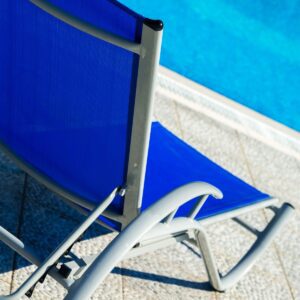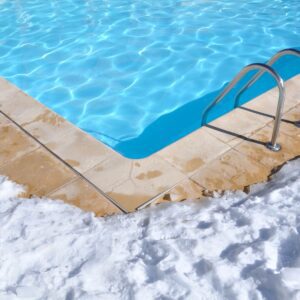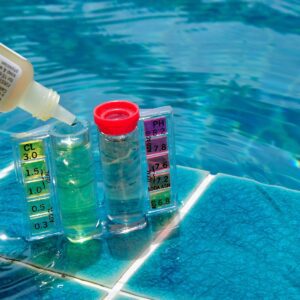Dirt in your pool can be a frustrating problem for any pool owner. Not only can it be unsightly, but it can also make swimming uncomfortable and even lead to health problems. In this article, we will explore the causes of dirt in your pool, ways to clean it up, and steps you can take to prevent it from returning.

Read Next
Dirt in the pool - If you notice that your pool filter is blowing dirt back into your pool, there could be a few reasons why. Pool filters can become clogged with dirt and debris, which can reduce their effectiveness.
Additionally, pool filters need to be cleaned on a regular basis to prevent them from becoming clogged and blowing dirt back into the pool. Here are a few tips on how to tell if your pool filter is clogged and how to clean it so that it doesn't blow dirt back into the pool.
It's important to take action to clean the filter and prevent debris from building up. In this blog post, we'll discuss some of the reasons why pool filters can become clogged with dirt, as well as how to clean them so that they don't blow dirt back into the pool.
Why Is There Dirt In Your Pool?
The first step is to understand why there might be dirt in your pool in the first place. There are a few reasons this could happen, including if someone tracked dirt into the pool area or if there's a lot of debris in the pool itself.
Possible Causes Of Dirt In Pool
- Debris Blown by the Wind: One of the most common reasons for dirt in a pool is debris that is blown into the pool by the wind. This can include leaves, twigs, grass clippings, and other organic matter.
- Swimmers Bringing Dirt into the Pool: Swimmers can bring in dirt, sand, and other debris on their feet, which can settle at the bottom of the pool and make the water murky.
- Pets Jumping into the Pool: Pets who jump into the pool can bring in dirt, leaves, and other debris from outside.
- Poorly Maintained Equipment: Equipment that is not functioning properly can also contribute to dirt in a pool. A clogged filter or a malfunctioning skimmer basket can allow debris to accumulate in the pool.
- Nearby Construction: If there is construction occurring nearby, soil and dust from the construction site can find their way into the pool.
- Nearby Landscaping: Landscaping near the pool can also be a source of dirt and debris, especially if there are trees or bushes that shed leaves or other organic matter.
- Rain and Runoff: Rainwater and runoff from nearby areas can also carry dirt and debris into the pool, especially if the pool is located on a slope or near a low point.
- Soil Erosion: If the area around the pool is not properly graded, soil erosion can occur, leading to dirt and debris being washed into the pool during heavy rain.
Steps to Remove Dirt from Your Pool
- Skim the Surface: Use a pool skimmer to remove any debris that has accumulated on the surface of the water, such as leaves, twigs, and insects. Regularly skimming the surface helps to prevent the debris from sinking to the bottom of the pool and making it more difficult to clean.
- Vacuum the Bottom: Use a pool vacuum to clean the bottom of the pool. Start by brushing the pool walls and floor to loosen any dirt and debris. Then, vacuum the bottom of the pool, paying extra attention to areas where debris tends to accumulate.
- Brush the Walls: Use a pool brush to scrub the walls of the pool to remove any dirt and algae buildup. Regular brushing helps to prevent the buildup of algae and other contaminants that can make the pool water cloudy and unappealing.
- Clean the Filter: The pool filter helps to remove debris and other contaminants from the water. It is important to clean the filter regularly to keep it functioning properly. Depending on the type of filter, this may involve backwashing, rinsing, or replacing the filter cartridge.
- Check and Adjust the Chemical Levels: Regularly test the pool water to ensure that the chemical levels are balanced. This includes checking the pH, chlorine, alkalinity, and calcium hardness levels. Adjust the chemical levels as needed to ensure that the water is safe and clean.
- Shock the Pool: Shocking the pool involves adding a high dose of chlorine or other sanitizing chemicals to the water to kill any bacteria or algae that may be present. Shocking the pool is typically done once a week or as needed to keep the water clear and clean.
What To Do About Dirt In Pool
If you notice that your pool filter is becoming clogged with dirt, it's important to clean it as soon as possible. Otherwise, the dirt can build up and cause the filter to blow dirt back into the pool. To clean a pool filter, you'll need to remove it from the pool and hose it down with clean water.
In addition to cleaning your pool filter, there are a few other pool maintenance tasks you should be aware of. These include regularly skimming the pool for leaves and debris, as well as checking the pH level of the water.
One way to tell if your pool filter needs to be cleaned is to check the pressure gauge. If the pressure is higher than normal, this could be an indication that the filter is clogged and needs to be cleaned.
Conclusion
Thanks for reading! In this blog post, we discussed some of the reasons why pool filters can become clogged with dirt, as well as how to clean them so that they don't blow dirt back into the pool.
We also touched on some of the other pool maintenance tasks you should be aware of, including regularly skimming the pool for leaves and debris, as well as checking the pH level of the water. By following these tips, you can help keep your pool clean and debris-free all season long.





Comments
No Comments